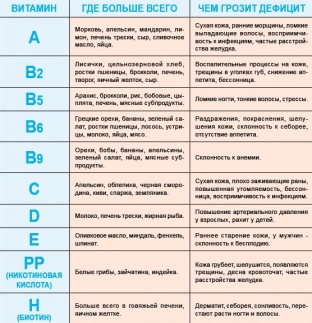You can improve your health through small changes in your lifestyle and diet. A sufficient amount or deficiency of vitamins can significantly affect your well-being. Unfortunately, in our time to find a truly natural and healthy product is not so easy – manufacturers are trying to save on everything.
Besides, not everyone has a balanced diet. Estet-portal.com will tell you what signs may indicate a vitamin deficiency, and also explain how you can solve the problem.
Common Vitamin Deficiency Symptoms and Solutions
The following are symptoms that, among other things, may indicate a lack of certain vitamins in the body.
- Cracks in the corners of the mouth
This problem may indicate a deficiency of B vitamins (particularly B2, B3 and B12), zinc and/or iron. Therefore, if you often have cracks in the corners of your mouth, try eating more salmon and other seafood, eggs. Vegetarians can increase their intake of lentils, legumes, peanuts, tomatoes, sesame, and chard.
Important: Vitamin C and iron are necessary for better absorption of these vitamins, so they should also be included in the diet.
- Skin rash and hair loss
If you can't figure out why your hair is falling out more than usual, consider whether you are getting enough zinc, vitamin B7, vitamin A, vitamin D, vitamin E, and vitamin K.
Include more dried fruits, pumpkin seeds, whole grains, dairy products, avocados, mushrooms, raspberries and bananas in your diet.
Important: Sometimes vitamin B7 deficiency can be caused by excessive consumption of eggs, the protein of which prevents the absorption of vitamin B7.
- Acne on cheeks, arms and thighs
Vitamin A and D deficiency possible. Reduced saturated and trans fat intake is recommended. But fish, flax seeds, dried fruits, almonds, carrots and red peppers should be added to the diet.
- Burning, itching and numbness of the extremities
It is possible that such symptoms are caused by a deficiency of B vitamins, namely B6, B9 and B12. More asparagus, spinach, leafy vegetables, eggs and seafood – and perhaps the problem can be solved.
Important: the lack of these vitamins can adversely affect the nerve endings in the skin. In addition, this deficiency can cause depression, fatigue, exhaustion, anemia, and hormonal imbalances.
- Cramps and pain in the legs
There are many causes of cramps and pain in the lower extremities, common triggers for such symptoms are vitamin B deficiency, as well as potassium, calcium and magnesium deficiency. If this is the problem, try eating more bananas, walnuts, almonds, pumpkins, cherries, apples, kale, grapefruit, spinach, and dandelion.
Important: This problem often occurs with regular intense exercise. Sweating leads to a decrease in the level of water-soluble vitamins. To compensate for the lack of vitamins, it is not necessary to stop exercising – you just need to adjust the diet.

Vitamin deficiency: symptoms depending on the missing substance
Vitamin A:
- fatigue;
- skin problems;
- dental problems and bleeding gums;
- impaired vision in poor light conditions.
Vitamin B:
B1:
- insomnia;
- fatigue;
- muscle weakness;
- depression;
- irritability;
- weight loss;
- heart and digestive problems.
B2:
- eye irritation;
- oily skin;
- fistulas in the oral cavity;
- rash and inflammation.
B3:
- headaches;
- lack of energy;
- bad breath;
- anxiety;
- ulcers;
- worsening of appetite;
- GI problems.
B5:
- burning in legs and feet;
- convulsions;
- fatigue;
- insomnia;
- vomit;
- disturbance of the usual rhythm of the heartbeat.
B6:
- insomnia;
- skin problems;
- hair loss;
- convulsions;
- fluid retention.
B12:
- fatigue;
- diarrhea;
- depression;
- anxiety;
- loss of appetite;
- inflammation in the oral cavity;
- hormonal imbalance.
Vitamin C:
- slow healing of wounds and cracks;
- bleeding from the nose and gums;
- pain in the joints;
- indigestion;
- anemia;
- increased bruising.
Vitamin D:
- weak bones;
- rickets;
- dental caries;
- kidney stones;
- muscle weakness;
- poor calcium absorption.
Vitamin E:
- anemia;
- anxiety;
- decreased reproductive function;
- impaired reflexes;
- disbalance.
As you can see, the symptoms of a lack of various vitamins are often similar, therefore, in order to determine the missing substances in the body as accurately as possible and effectively eliminate the problem, it is recommended to consult a doctor who, based on the tests performed, will indicate what the body lacks and what methods to compensate for the deficiency (depending on on his degree, for example) You'd better use.






Add a comment